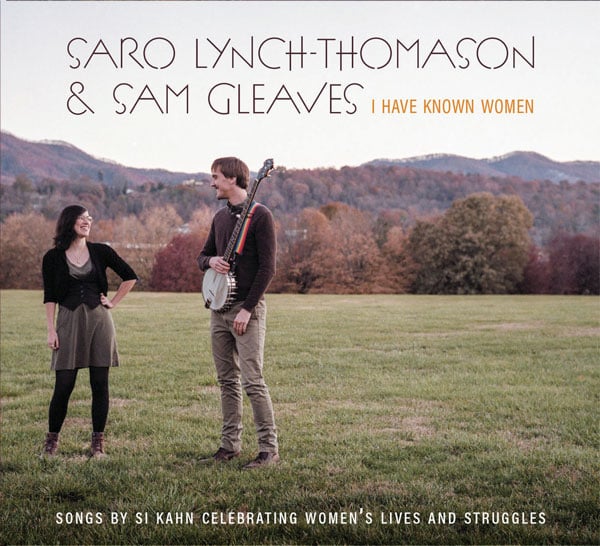I Have Known Women: Songs By Si Kahn | Celebrating Women’s Lives and Struggles
 I Have Known Women: Songs by Si Kahn Celebrating Women’s Lives and Struggles
I Have Known Women: Songs by Si Kahn Celebrating Women’s Lives and Struggles
On the 100-year anniversary of American women winning the right to vote, Saro Lynch-Thomason and Sam Gleaves have released a collection of 13 songs penned by Si Kahn—most never recorded before. Female subjects are profiled, ranging from the local midwife “granny woman on her flop-eared mule” in “I Caught the Sherriff” to Harriet Tubman, an over-the-road truck driver, immigrants, and people of color struggling for safety and freedom.
Folk music fans and those who enjoy songs with a message will enjoy the a cappella and sparse instrumental treatment featuring Gleaves on guitar and clawhammer banjo; Liam Purcell on fiddle mandolin and lead guitar; Hasee Ciaccio on acoustic bass; John Gardner on percussion for two cuts; and Lynch-Thomason on the Shruti box on one song. Saro’s vocals are reminiscent of Joan Baez, with a slightly lighter, lilting tone. Sam and Saro’s voices are well-matched and blend perfectly, swapping lead and harmony roles.
Listen to the full album at once rather than by selected cuts to get the full impact, which is like a musical drama spotlighting one strong woman after another in a different challenging time and situation as she faces enemies with bravery and sometimes humor.
“Ten Thousand Miles Away” is a mother’s lament for a child taken to prison 10,000 miles away. Accompanied by mountain dulcimer, “Aliens” offers this empathetic perspective on immigration: “Over the mountains, across the water, each lonely immigrant is some land’s native daughter.”
“Conductor” tells the story of Harriet Tubman, the well-known conductor of the underground railroad for slaves fleeing to northern states. The a cappella “Nobody’s Body but Mine” is a pro-choice anthem, and “Red Haired Becky” is a murder ballad with an unexpected twist. This time the woman takes justice, and a rifle, into her own hands. The latter song features Saro’s voice accompanied by a Shruti box, an instrument used predominantly in Indian classical music that uses the same bellows design as a harmonium or pump organ to produce a haunting drone chord.
The title track, originally from Kahn’s musical Mother Jones in Heaven (and Hell) states: “I have known women whose bodies were broken—there in the factory, the laundry, the home and the mill. Who will stand up for them, who will speak up for them now?”
The humorous “Praise Boll Weevil” is about the 1920s advent of the insect that shut down the cotton industry, relieving the back-breaking burden of almost two million sharecroppers and tenant farmers. “The Border” shares the plight of an undocumented immigrant on the southern U.S. border. “Truck Driving Woman” features a nice bass solo from Ciaccio and asks the musical question, “Ain’t you never seen a truck drivin’ woman, 90 pounds of fire in a five-foot frame?”
“1920” is a women’s suffrage song co-written by Gleaves and Lynch-Thomason with Kahn, and “No More, No More” could be the soundtrack for the movie, The Help. Enough is enough, indeed. The closer, “Room for All,” is a catchy, up-tempo union tune accented with percussion and hand claps. Highly recommended, for those who like discovering new songs and who have ears to hear.
REVIEWED BY NANCY CARDWELL
